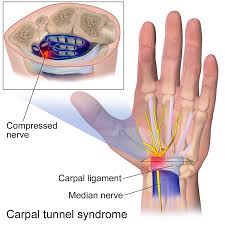
According to the Centers for Disease Control and Prevention, Carpal Tunnel Syndrome (CTS) impacts approximately 3.1% of working adults each year. The median nerve becomes entrapped or compressed, causing discomfort in patients. It may happen when the nerve swells, surrounding tendons become inflamed, or an injury causes swelling in the carpal tunnel. Symptoms of CTS can start gradually with numbness or tingling in the thumb, index and middle fingers and its symptoms are episodic. Initially, symptoms simply cause with discomfort in the wrist and hand. However, left untreated, CTS can have a negative impact on a person’s quality of life; permanent numbness in the fingers and permanent weakness in the muscles that are impacted by the median nerve can occur.
The most common symptoms of Carpal Tunnel Syndrome are:
- Tingling or numbness:
Many people with CTS experience tingling and numbness in their fingers or hand. These sensations occur often in the thumb, index and middle or ring fingers. Symptoms flare while holding something; often, holding a newspaper or book, a steering wheel or computer mouse or even a phone can cause a sensation like an electronic shock in these fingers. Further, as the syndrome progresses, the sensation may wake sufferers from sleep, and the numbness can become constant over time.
- Weakness:
People with CTS may experience weakness in the affected hand and a tendency to drop things they attempt to grasp.
What can you do to help this condition that does not involve drugs or surgery?
Some people find relief of symptoms by splinting, or taking NSAIDs or Corticosteroids. Although these treatments may help alleviate symptoms, they do not cure the issue or eliminate the underlying cause. Typically, however, the most common medical procedure to eliminate the issue is carpal tunnel surgery. The carpal tunnel is an narrow opening in the wrist through which the median nerve travels. Since those who suffer from CTS are anatomically compromised in that region and as a result the median nerve is irritated and swells, many people opt to simply enlarge the opening. This procedure decreases the irritation on the median nerve and provides relief.
In our experience, Upper Cervical adjustments can alleviate or even eliminate symptoms of Carpal Tunnel Syndrome. Additionally, patients often notice improvements in other problems they some of the problems that that they are experiencing. This relief is possible for because correcting the atlas re-balances muscle tone. Adjustment creates a “trickle down” effect, allowing the joints of the body move better and return to the positions that they were intended to be in.
Please call our office at 217-698-7900 to be evaluated for Carpal Tunnel Syndrome, or to hear how we can help alleviate your symptoms.

Recent Comments